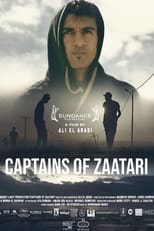Imagine a film where Cinderella goes to the ball, has her magical moment, and then returns to the cinders to make the best of her life as a servant to a cruel family. If you know Cinderella, you know she is resilient, and she will keep singing and will find friendly relationships to sustain her, even if they are only animal friends.
Captains of Zaatari is a documentary that unfolds like such a story, and the real ending is still evolving. The film is not a downer and draws you into life inside a Syrian refugee camp where resilience, friendship and family are what sustain you. And in this case, sports (football) also brings young males purpose, meaning, and perhaps, opportunity.
First-time Director Ali El Arabi came across the 2 boys, Fawzi and Mahmoud, in 2013, and they bonded through football. As he follows them over several years, they end up getting an opportunity to play at the Aspire Academy in Qatar. That is their Cinderella at the ball moment, where they hope to show well enough to get recruited into the Aspire Academy.
The soccer and going to the ball in Qatar
If you look at the google map for the Zaatari refugee camp, you can see that there is only one soccer pitch. At the time of filming, the pitch was dirt, and children played barefoot, or in sandals, and some had cleats. The ball might be homemade.
Thus, when the boys go to Aspire, they run on grass for the first time. They swim in a pool, they go boating in the Persian Gulf, they have 24-hour electricity and Internet, their injuries are iced. They also get to meet and observe some of football’s greats: Xavi Hernandez, Trézéguet, and Bayern’s Ribery, Lewandowski, and Robben. You wonder how they will be mentally able to return home to the refugee camp.
The film does not explicitly explain problems like that or how they are resolved or not. We see life in the camp, but we don’t really understand how things work, e.g., how Fawzi is able to travel to visit his father. Fawzi’s father is diagnosed with terminal cancer, and some period of time later, we know he is gone.
As another example, as captain of the team, Fawzi tries out for the Aspire opportunity, but because he is born in 1998, he is too old to play U-17. Then, suddenly, he gets permission to meet up with the team in Qatar to play in the Jan-2017 Alkass International Cup. This really caught my attention because birth dates and age are pretty important in youth sports. After researching, I realized that Qatar invited the Syrian Dream team and the Chapecoense U-17 to participate in friendlies at the tournament, I assume as humanitarian gestures and self-promotion that leveraged the two tragedies.
Qatari Sportswashing
Which brings me to the 10 year old controversy of Qatar hosting WC 2022 and its oil-fueled influence on football. Qatar’s Alkass tournament and the refugee team are examples of sportswashing. Qatar spent some money to bring a few youth teams to its facilities and impress the world with its humanitarianism. But the nation of Jordan is spending almost $1B a year caring for refugees. Which country is doing more for humanity, and which country is getting more credit?
The refugee crisis
Zaatari is the largest refugee camp of Syrians. It has been in operation since 2012 and at 80,000 people has the population to rank as one of the 20 largest cities in Jordan (pop 10M). I intend to watch a non-soccer film, Salam Neighbor (2015) which also presents stories from the Zaatari camp.
I watched this film through SF Film Festival, and in the director’s interview, they mentioned that Fawzi and Mahmoud are presently coaching a generation of boys who were born in the camp. Now 21 years old, neither man has plans to leave the camp, although they would like to get coaching certifications. Perhaps the biggest benefit of the film is that they will get enough media exposure that benefactors will help them realize their dreams for better opportunities. As Mahmoud says in the Alkass press conference,
“All a refugee needs is opportunity, not your pity”.
Mahmoud Dagher
Beirut Parc (2016) is another soccer movie that addresses football and refugees (in Lebanon). Men in the Arena (2017) is a documentary that helped its two Somali footballers get to America.
7 Soccer Movie Mom Rating = 7
Resources:
- Released: 2021-01-31 (Sundance)
- Also known as Captains of Za’atari
- 73 minutes
- I watched this via the SFFilm Festival
- In Arabic with English sub-titles
- IMDB
- Director: Ali El Arabi
- Stars: Fawzi Qatleesh , Mahmoud Dagher

